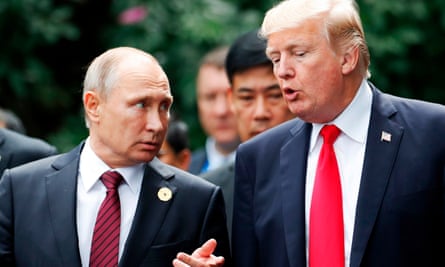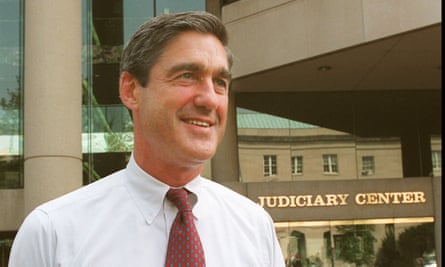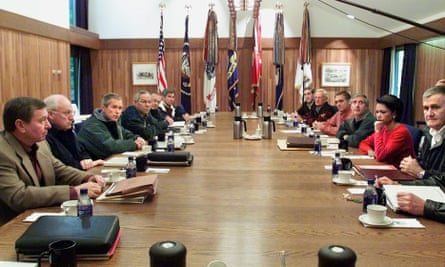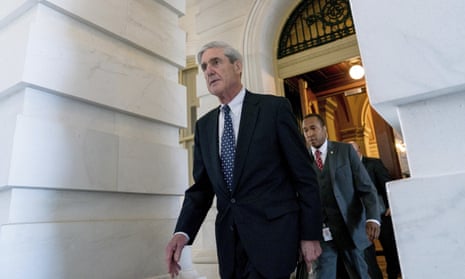Robert Swan Mueller III wears a $35 Casio watch with the face on the inside of his left wrist, in the style of an infantryman trying to avoid giving away his position with a glint of sunshine off the glass.
Covert and careful, Mueller is still moving with stealth in Washington DC, 50 years after he was shot and wounded in Vietnam as a first lieutenant in the US Marines.
For 18 months now, the former long-serving director of the FBI has been the calm centre of a gathering storm which may be about to break over Donald Trump’s White House.
During an exhausting period of perpetual leaks across DC, the office of Special Counsel Mueller has stood apart, seemingly impervious and water-tight.
While Mueller has cast a shadow over Trump for 18 months now, he has been almost entirely silent since he was brought out of retirement as a special counsel tasked with picking up the FBI investigation into Russian interference in the 2016 US election, and “any links and/or coordination between the Russian government and individuals associated with the campaign of President Donald Trump”.
Mueller’s silence has led to intense scrutiny of his personal appearance – that watch, steely hair parted on the left with scrupulous accuracy, his pin-striped Brooks Brothers suits, the white Oxford button-down collar shirts, always paired with dull geometric print ties. A study in methodical caution.
Robert De Niro has played him with predictable menace on Saturday Night Live, looming like a predator from every shady character’s worst nightmare.
Trump, of course, has had a lot to say about Mueller – denouncing his work as an all-caps “WITCH HUNT”, calling him “highly conflicted” and declaring last week that his team was not only “a disgrace to our Nation” but had gone “absolutely nuts”.

In attempting to discredit Mueller, Trump has implied that the lifelong Republican is a partisan stooge of Barack Obama. In fact, since the 1980s, Mueller has been appointed to public positions – as prosecutor and investigator – by five consecutive presidents, one of them called Reagan and two of them called Bush.
He was inherited by Obama as director of the FBI, and was so widely admired that when his term limit of 10 years in the job approached, the Senate voted 100-0 to change the law so that he could stay on for two more years.
Garrett Graff, author of The Threat Matrix: Inside Robert Mueller’s FBI and the War on Global Terror, interviewed Mueller for about 12 hours for the 2011 book. He said: “He is probably America’s straightest arrow, very by-the-book, very professional.”
The word integrity seems to be almost sewn into the fabric of his pin-striped suits. “It’s why [Deputy Attorney General] Rod Rosenstein brought him into this role of special counsel,” Graff said, “because he is probably the one person in Washington that you could never accuse of having a partisan agenda – he’s always seen things with a very strong moral compass, instilled in him by his father, and really sees the world with a pretty black and white, right or wrong vision.”
Following a period of self-imposed public inactivity during November’s midterm elections, there is a new urgency surrounding the investigation.
Trump has fired the attorney general, Jeff Sessions, and installed Matthew Whitaker, a political ally who many fear will move to shut Mueller down; Trump has huddled with lawyers and has submitted his written answers on questions from Mueller’s team about possible collusion between his campaign and Russia; Paul Manafort, the convicted former Trump campaign chairman, is co-operating with the special counsel and by 26 November could be unveiled as a star witness in a new criminal case aimed squarely at Trump world. Could Donald Trump Jr or the longtime Trump aide Roger Stone be next?
Yet as rage, speculation and tension mount, Mueller keeps his profile low.

Born into privilege, forged in combat
Like Donald Trump, Robert Mueller was born into money and east coast privilege, the son of an executive at the DuPont industrial conglomerate, educated at an all-male school where he excelled at sports, ranging from lacrosse to soccer.
But their paths really diverged in the Vietnam era.
Trump, 22 months younger than Mueller, got a medical disqualification from service due to “bone spurs” in his foot and went on to a life dedicated to private gain.
Mueller began a life of public service. He graduated from Princeton in 1966 and signed up for the US Marines.
Mueller reached Vietnam in late 1968, the bloodiest year of the war, and as a rookie second lieutenant, aged 24, found himself leading an infantry company which was part of a marine regiment nicknamed the Magnificent Bastards.
Graff recently pieced together Mueller’s untold Vietnam story for Wired magazine after contacting 140 members of the unit and told how Mueller was decorated for valour after rescuing injured marines under heavy fire.
The commendation for Mueller’s Bronze Star read: “Second Lieutenant Mueller’s courage, aggressive initiative and unwavering devotion to duty at great personal risk were instrumental in the defeat of the enemy force.”
Months later, after he was promoted to first lieutenant, Mueller was engaged in a close firefight. Graff wrote: “The incoming fire was so intense – the stress of the moment so all-consuming, the adrenaline pumping so hard – that when he was shot, Mueller didn’t immediately notice. Amid the combat, he looked down and realized an AK-47 round had passed clean through his thigh.
“Mueller kept fighting.”
Mueller has spoken only once in public since taking on his role heading the Russia investigation. In May 2017, 12 days after accepting the special counsel role, he gave the commencement address at Tabor Academy, where his granddaughter was one of the students graduating.
He spoke of the lessons of service, which he said he had learned from his family, his marine corps family, and his FBI family.
Setting himself, perhaps unwittingly, as the polar opposite of Donald Trump, Mueller urged the students to act with integrity and honesty.
“You can be smart, aggressive, articulate, indeed persuasive, but if you are not honest, your reputation will suffer, and once lost, a good reputation can never, ever be regained.”
Mueller came back from the war, went to law school, became a federal prosecutor and worked his way up to become head of the criminal division at the Department of Justice.

As acting deputy attorney general, he was in charge of the investigation and indictment of Abdelbaset al-Megrahi, the Libyan convicted of the terrorist attack that brought down Pan Am flight 103 over Lockerbie in Scotland just before Christmas 1988.
In 1993, Mueller left the Department of Justice to go into private practice, but he returned after two years, effectively starting again, as a junior homicide prosecutor in Washington DC.
Within six years, George W Bush had made him head of the FBI - and one week after he took the post, the 9/11 attacks on New York and Washington happened. Mueller had to change the FBI from a domestic law enforcement organisation to an international intelligence agency whose first task was to prevent the next attack.

While he is lionised, Mueller has flaws and has acknowledged mistakes. In a long onstage interview in 2015 with the journalist Aaron Harber, he spoke about his failure to delegate and admitted that he micro-managed the FBI’s anti-terrorism operations. He has also conceded that he lost control of moves to modernise the computer records of the FBI, which were delayed and over-budget.
“When you look at the criticism that he faced as FBI director, his strength was the same as his weakness - hard-driving and not one to entertain a lot of dissent or dissension,” Graff said. “He will debate decisions, but once a decision is made he will push forward. You can see that he was never, at the FBI, a warm and fuzzy leader.”









